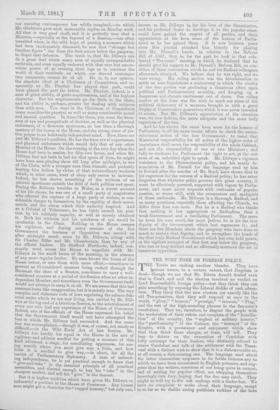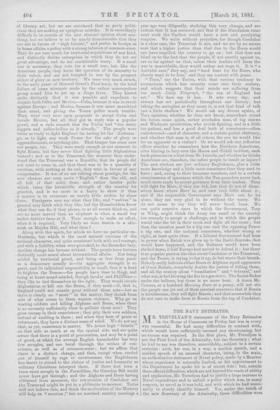THE TORY TONE ON FOREIGN POLICY.
THE Tories are making another blunder. They have Ilecome aware, to a certain extent, that Jingoism is dead—though we see that Mr. Edwin Arnold denied even that in Court, and said the election involved no verdict on Lord Beaconsfield's foreign policy—but they think they can. gain something by exposing the Liberal dislike of rash adven- ture. They fancy that the new electors are exactly like the old Ten-pounders, that they will respond at once to the • words, " glory," " honour," " prestige," " interest," "
and the rest of the high-sounding phrases in the fire-eater's- vocabulary. They try, therefore, to disgust the people with the moderation of their rulers, and complain of the " humilia- tion" of the country, the " neglect of military honour," the "pusillanimity " of the Cabinet, the "betrayal " of the Empire, with a persistence and enjoyment which show that they think those charges, at least, will tell. They leap to debate on the evacuation of Candahar with lofty contempt for their leaders, who distinctly refused to annex Candahar, and talk of the settlement with the Trans vaal with a distinct wish to show that it is a dishonourable or,. at all events, a dishonouring one. The language used about the latter transaction surpasses in its feeble violence any to which we have been accustomed in English polemics, and sug- gests that the writers, conscious of not being quite in earnest, and of writing for popular effect, are whipping themselves knowingly into fury, hoping that the fire may catch. They might as well try to fire oak saplings with a tinder-box. We have no complaint to make about their language, except in so far as we dislike seeing publicists reckless of the laws
of literary art, but wo are convinced that as party politi- cians they are making an egregious mistake. It is exceedingly difficult to be certain of the new electors' opinion about any- thing, but we believe it to be nearly demonstrable that they are not in favour of "high falutin'," and prefer, in foleign.as in home affairs, a policy with a strong infusion of common-sense. They do not care much for territorial acquisitions of any kind, and distinctly dislike enterprises in which they do not see great advantage, and do see considerable worry. If a small war is necessary, they vote for a small war, but, like the American people, they leave the question of its necessity to their rulers, and are not tempted to war by the prospect either of glory or new territory. We were very much struck, in the early years of General Grant's Presileney, by the total failure of some attempts made by the rather unscrupulous group round him to get up a Jingo fever. They hinted quite distinctly that it was possible and expedient to acquire both Cuba and Mexico,—Cuba, because it was in revolt against Europe ; and Mexico, because it was more anarchical than usual, and giving the Texan police much trouble. They weut very near open proposals to accept Cuba and invade Mexico, but all they got in reply was a popular growl, and a rude remark that the Union had "too many niggers and yaller-bellies in it already." The people were twice as ready to fight England for having let the Alabama' go, as to fight any weak Power for the sake of glory or aggrandisement, or anything else. That temper has come over oar people, too. They were ready enough at one moment to fight Russia, but they never liked fighting little Afghanistan instead ; and as to the Transvaal, the moment they under- stood that the Transvaal was a Republic, that its people did not want to come in, and that there was to be a quantity of exertion, with nothing at its end, they were in favour of any compromise. It was of no use talking about prestige, for the new electors are even more " English " than the old, and all full of that solid, dour, and rather insular pride which takes the irresistible strength of the country for granted, and is no more in a hurry to show it than a master is to overcome an unruly little urchin by sheer eforee. Foreigners may say what they like, and " natives " in general may think what they like, but the Householders know what they can do, if they please, or at all events think so, and are no more moved than an elephant is when a small boy - makes derisive faces at it. Time enough to make an effort, when it is required. Very likely we were beaten in a skir- mish on Majuba Hill, and what then I Along with this. spirit, for which we have no particular en- thusiasm, but which is the most natural outcome of the national character, and quite consistent both with cool courage, and with a liability, when over-provoked, to the Berserker fury, another change has become evident, The people have become distinctly more moral about international affairs. Not being misled by territorial greed, and being as free from panic as a democracy usually is—its aggregate strength is so great, and its individual responsibility so small, that it is hard to frighten the Demos—the people have time to think, and being at heart sound-minded, though insular and Phili.stine- they like to feel themselves in the right. They would invade Afghanistan or kill out the Boers, if they must—if, that is, England could not remain great without those acts—but as there is clearly no " must " in the matter, they shrink from acts of what seems to them wanton violence. Why go on wasting soldiers and killing Afghans and Boers, when there is no necessity sufficiently clear to palliate those acts? They grow uneasy in their consciences ; they pity their own soldiers, instead of exulting in them ; and when they hear of peace or retirement, they have a distinct sense of relief. We do not say that, as yet, conscience is master. We detest high " falutin'" /an that side as much as on the cynical side, and are quite ,aware that there is a point of provocation, and may be a point ,of greed, M which the average English householder has very ,few scruples, and can burst through the wither of con- , science, as well as of common-sense ; but we affirm that there is a distinct change, and that, except when carried .out of himself by rage or covetousness, the Englishman has learnt to attend to the claims of justice and humanity as ordinary Christians interpret them. If there had been a
trace more scruple in the Parnellites, the Coercion Bill would never have got through ; and the Afghans and Boers having abstained from massacre, the retrocession of Candahar and the Transvaal might be put to a plebiscite to-morrow. Tories will not believe this, and think the moderation of the Ministry avill help on " reaction ;" but we watched country meetings a year ago very diligently, studying this very change, and are certain that it has occurred, and that if the Dissolution came next week the Carlton would have a new and paralysing surprise. We write without prejudice, for though Candahar is a clear case, the Transvaal is not, and we are by no means sure that a higher justice than that duo to the Boers would not have impelled the country to go on ; but that does not blind us to the fact that the people, if not exactly against us, are so far against us that, unless their leaders tell them the war is unavoidable, they would rather not wage it. It is " a doubtful case," they say, and "hard lines for the Beers, who clearly want to be free," and they are content with peace.
" Then," say the Tories, with that curious tendency to sereaminess which has recently come into their oratory, and which suggests that their minds are suffering from too much Daily Telegraph, " the sun of England has set." We dare say it has. It sets every day, and always has set periodically throughout our history ; but taking the metaphor as they mean it, is not that kind of talk just a little shallow I We would ask any decent squire, of Tory opinions, whether he does not know, somewhere round his house, some quiet, rather overladen man, of big sinews and Wesleyan proclivities, who avoids fighting, and is a little too patient, and has a good deal both of conscience—often uninstructed—and of character, and a certain quaint obstinacy, and whether that man is, of all others, the one he would like for an opponent or a victim ? Or we would ask any reflective officer whether ho remembers how the Northern Americans, after blazing in fury over the Mason and Slidell incident, sank back quiescent on a hint from Mr. Lincoln, and whether he thinks Americans are, therefore, the safest people to insult or injure ? The now electors are just ordinary Englishmen, plus a little more knowledge and a little more conscience than they used to have ; and, owing to their immense numbers, and to a certain consciousness of ignorance which the Ten-pounders never had, much more ready to accept guidance from their leaders. They will fight for Merv, if they are bid, but they do not of them- selves know where Mery is, and care very little about it ; and if the responsible Government says Mery can be let alone, they are very glad to be without the worry. We do not mean to say they will never break loose. We can quite conceive cases in which the Government, Tory or Whig, might think the Army too small or the country too unready to accept a challenge, and in which the people would take the bit in their teeth and fight all the same ; but then the occasion must be a big one and the opposing Power a big one, and the national conscience, whether wrong or right, at least quite clear. If a Liberal Government had been in power when Batuk was given up to the Bashi-Bazouks, that would have happened, and the Sultanet would have been shelled down, if half Europe had united to defend it ' • but there is no popular passion like that about Candahar or the Transvaal, and the Tories, in trying to fan it up, do but waste their breath. Nobody really believes either Boers or Afghans equal opponents of Great Britain, everybody doubts the justice of killing them, and all the oratory about " humiliation " and " betrayal," and what not, is but blowing the fire in a gas stove. The flames flicker under the bellows, but there is no more heat. A dozen Mr. Cowens, or a hundred Morning Posts at a penny, will not stir the people one jot out of their internal assurance that if Russia is troublesome, they will fight Russia; and that meanwhile they do not care to make faces at Russia from the top of Candahar.



































 Previous page
Previous page